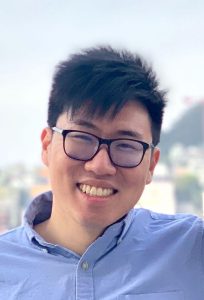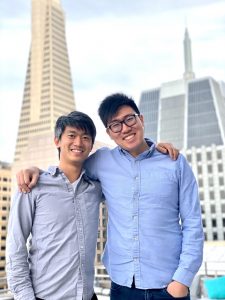
Jimmy Ren
University of Pennsylvania
Philadelphia (39.9° N, 75.1° W)
featuring Rick Song, Co-founder & CEO, Persona, San Francisco (37.7° N, 122.4° W)
Becoming a Forbes 30 Under 30 doesn’t necessarily mean the person went on a well-crafted path, driven with unlimited  inspiration and drive to achieve a dream they had since they were a child. Instead, Rick Song, co-founder and CEO of Persona, a start-up that offers a comprehensive and automated identity and verification software, stayed grounded and explored the opportunities he had while staying open and friendly to those around him. Something I know many people worry about is the fact that they don’t see themselves anywhere, but Rick’s story reassures people that staying open to pursuing new opportunities along with sharing genuine connections with people will get you to where you want to be.
inspiration and drive to achieve a dream they had since they were a child. Instead, Rick Song, co-founder and CEO of Persona, a start-up that offers a comprehensive and automated identity and verification software, stayed grounded and explored the opportunities he had while staying open and friendly to those around him. Something I know many people worry about is the fact that they don’t see themselves anywhere, but Rick’s story reassures people that staying open to pursuing new opportunities along with sharing genuine connections with people will get you to where you want to be.
Currently, Rick is pursuing the opportunity to transform an industry with new ways for organizations to uniquely verify a customer’s identity to prevent fraud and ensure trust and safety in any transaction. He grew up in Texas and attended the Texas Academy of Math and Science (TAMS) before moving on to graduate from Rice University in 2013 with a Bachelor’s Degree in Computer Science, Mathematics, and Economics. He moved on to serve as an engineering fellow at Kleiner Perkins Caufield & Byers (Kleiner Perkins). There, he gained some experience and eventually joined Square Capital the following year, where he spent five years working as an engineering manager working on underwriting, fraud, and identity. During this time, his passion for the identity space grew, and in 2018, he left Square to co-found Persona with room-mate, best friend, and CTO Charles Yeh. As CEO, he oversees many responsibilities: most importantly, building the right team to do continue to fulfill their company’s mission. Rick primarily focuses in on creating an effective team that not only gets the job done, but also getting people who have a positive impact on the company’s culture and values. By having happy and enthusiastic people at work, it encourages new employees to feel the same and produces an environment that allows for the company to flourish. Rick also focuses on producing sales and product direction, and most importantly dealing with the issues that may come up as Persona continues to grow.

When I first heard about Rick, the first couple of words under his description were “Forbes 30 under 30”. As a freshman in college who had no idea about what he wanted to do, the prospect of speaking to him was immediately intimidating. Someone with so much success at that age seemed like they would have each detail of their future worked out. But by the first minute of our conversation, I could tell that Rick isn’t the type to tediously plan out his life. Instead, he stood by his principles passed down to him by his parents like treating others with kindness, leaving the door open for new horizons to explore.
Various relationships in his life helped shaped him on the path where he is now. His parents also passed down to him the importance of relationships with people, an idea that has served Rick well throughout his profession. Without a doubt, treating others with respect and kindness is essential to what Rick believes in. Each small act of kindness in the interactions he shared contributes to where he is today and towards the person he is now.
Looking back, his close relationships with his computer science professors led him to join the Kleiner Perkins Fellows Program, which led him to Square Capital. There, he grew new relationships with his mentors, who constantly challenged him to do better while offering important lessons about leadership along the way. In turn, his decision to start Persona came alongside his strong relationship with his roommate, who helped convince him to take the enormous risk of starting a company.
In retrospect, Rick’s career wasn’t exactly clear. His original goal was to move into finance and graduate, but quickly shifted towards software engineering. At Square, he grew as an engineer, a leader, and as a human being, and also discovered a deep passion for the challenges in the identity space. This, alongside the support and mentorship from his peers and colleagues alike, gave way for him to start Persona.
By appreciating life at the moment and not forcing the future to happen, Rick offered refreshing insight into what I believe everyone should remember to appreciate. Life is short, and the real interactions you have with other people should be something you are proud of. And in the midst of the tumultuous times of a new pandemic that we could have never foreseen, Rick’s message about the importance of solid human interactions stands more clear than ever.
P.S. Rick (rick@persona.com) is hiring
Highlights from the Interview:
Is there anything that your parents taught you that sticks out in your mind?
The value of hard work, without a doubt. My mom, in particular, felt it very important that we grew up being social. Another thing I think a lot of was about being a good person. It is incredibly impactful just to be a good person. It’s not easy, and good is obviously a very subjective thing. But I think there is something really important about being kind. In addition, getting far in career or being happy is much more about the people around you than anything else. It’s not about your job, it’s not about your money. A huge emphasis is on being healthy, and just taking care of yourself, which I’m still not very good at. And lastly, I would say that they taught me to be kind, which has had an enormous impact. Looking back, it just astounds me how these small interactions throughout my life have had such meaningful impact on any success I’ve had up to now.
What helped you take the step to become an engineer? What inspired you to continue along that path instead of going straight into economics?
There were two professors in the computer science department that I was relatively close with. It was actually, I believe, one of them who actually recommended me for the Kleiner Perkins Fellows program the first year that it was created. The firm suggested that I apply, and I decided, “Why not? I’ll go for it.” And one thing led to another and I wound up out here.
I could’ve gone into another internship in high-frequency trading. I think at the time, the industry was in somewhat of a decline, but it wasn’t quite as bad as it currently is. That was my original path, but I ended up taking this one because I was like, “What are the chances that I would get to work at a tech company?” I didn’t even really know what tech was, but I decided to just go for it.
Could you talk about how your mentors impacted you? Specifically, what aspects of your professional career have they left a mark on?
My mentor and former manager [Andy Kimball] had such a big impact because he constantly took bets on me. He gave me larger and large scope projects and always had confidence in me. These, days, I often talk a lot about the difference in being a manager and a leader. I think many folks always believe that management is leadership, and it’s just not. These days we look towards these titles to effectively grant some form of a leadership. Whereas leadership, as Andy taught me, is recognized. Your team will recognize you as a leader. You will know that you are a leader.
Andy gave me a lot of opportunities as I developed to be able to consistently become more of a leader. In this way, I had the chance to interact, hopefully, with almost everyone on that team in some meaningful way. He also taught me a lot about what it means to be a really great engineer. He’d taught me a lot about what it means to actually develop and grow, which is a very different kind of mindset from what I would consider the standard Silicon Valley mindset of growth. He also taught me about what it means to be a great engineer in the technical sense as well, as opposed to a lot of folks who are always focused on the next fancy technology, building something cool, and other things like that. He focused on drilling the fundamentals, great infrastructure, and great abstractions, some things that he always talked about. That, and also not over-engineering problems.
Lastly, he taught me, similarly to my mom, about being a good person. I think that with him, you just want to follow him because he represents so much of who you would like to be and grow into. So I ascribed so much of my career towards him in that sense. I still keep in pretty close-contact with him.
What skills do you think you use from college to fulfill your role and what’s asked of you?
Naturally, the foundational engineering skills I built up in college definitely helped me, but it doesn’t end there. The moment you graduate you realize everything you’ve learned was actually incredibly remedial, and that suddenly you have to constantly really push yourself to constantly improve at just the fundamentals of your engineering. Software engineering is just hard. So I’d say it was really important to learn various things from other folks.
Success for a startup oftentimes is mostly luck, frankly. But at the same time if you’re not good, you won’t catch that luck. And with all that, I’d say one of the critical skills to have is self-awareness. The fundamental thing about startups is to think about why people want yo work with you. I think in college you gain a lot of that perspective because you suddenly realize where you are. I think that keeps me grounded.
What advice would you give for someone in computer science or someone wanting to kind of build their own startup?
I would say number one, find a problem that you really do enjoy a lot. It won’t necessarily mean that there’s a startup there, and there is always an element of luck. For many folks who studied computer science 20 years ago, they got very lucky that it is blowing up right now. Back then it was not attractive whatsoever and it wasn’t a very well-paying job. I think you should find something that you enjoy, which is very helpful.
Number two, find people you know and work in a place longer than you think is comfortable. Build meaningful connections with other folks. These people, if you do well, may join you or help you. Find people like that, it will be the most important thing. I do not believe it’s possible to do a good startup without folks like that, and I think you have to find them out.
Three, be kind with people all along the way. Do something that sometimes doesn’t look always great for your self in the short-term. I think Steve Jobs said it first: you can’t connect the dots looking forward, you only can connect them looking back, but you got to make sure that the dots are there. And the only way to do that is by doing the right thing over and over and over. And that’s what sets up a trail of dots that will one day magically connect.
Interview excerpts have been lightly edited for clarity and readability.
